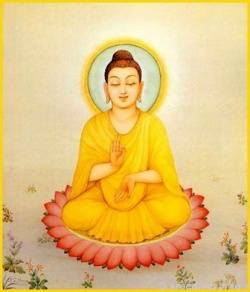Difference between revisions of "སངས་རྒྱས་"
Jump to navigation
Jump to search
m (Text replacement - "{{Dictkey|" to "{{BigTibetan|") |
|||
| Line 1: | Line 1: | ||
[[File:Boo30tbb.jpg|thumb|250px|]] | [[File:Boo30tbb.jpg|thumb|250px|]] | ||
| − | {{ | + | {{BigTibetan|[[སངས་རྒྱས།]]}} ([[Wyl.]] ''[[sangs rgyas]] '') ''n.'' {{Color|#808080|''Pron.:'' sangye}} ([[sangs rgyas]]) [[full awakening]] |
* [[Buddha]] | * [[Buddha]] | ||
* {{BigTibetan|[[བུདྡྷཿ]]}}, ''Skt.'' [[buddhaḥ]], {{BigTibetan|བུདྡྷཿཞེས་བྱ་བའི་སྒྲ་ལས་དྲངས་ན་གཅིག་ཏུ་ན། མོ་ཧ་ནི་དྲཱ་པྲ་མཏྟ་པྲ་བུདྡྷ་པུ་རུ་ཥ་བཏ་ཅེས་བྱ་སྟེ། གཏི་མུག་གི་གཉིད་སངས་པས་ན་མི་གཉིད་སངས་བ་བཞིན་ཏེ། སངས་པ་ལ་སྙེགས། ཡང་རྣམ་པ་གཅིག་ཏུ་ན། བུདྡྷཻ་ཏི་ཀཱ་ཤ་ནཱ་ད་བུདྡྷ་བི་བུདྡྷ་པདྨ་བཏ། བློ་བྱེ་ཞིང་རྒྱས་བས་ན་པདྨ་ཁ་བྱེ་ཞིང་རྒྱས་པ་དང་འདྲ་བར་ཡང་བཤད་དེ་སངས་རྒྱས་ཞེས་བྱའོ། ཚིག་གི་དོན་སྤྱིར་ན་ཆོས་ཐམས་ཅད་ཐུགས་སུ་ཆུང་ཅིང་མ་ལུས་པར་བྱང་ཆུབ་པ་ལ་བྱ།}} | * {{BigTibetan|[[བུདྡྷཿ]]}}, ''Skt.'' [[buddhaḥ]], {{BigTibetan|བུདྡྷཿཞེས་བྱ་བའི་སྒྲ་ལས་དྲངས་ན་གཅིག་ཏུ་ན། མོ་ཧ་ནི་དྲཱ་པྲ་མཏྟ་པྲ་བུདྡྷ་པུ་རུ་ཥ་བཏ་ཅེས་བྱ་སྟེ། གཏི་མུག་གི་གཉིད་སངས་པས་ན་མི་གཉིད་སངས་བ་བཞིན་ཏེ། སངས་པ་ལ་སྙེགས། ཡང་རྣམ་པ་གཅིག་ཏུ་ན། བུདྡྷཻ་ཏི་ཀཱ་ཤ་ནཱ་ད་བུདྡྷ་བི་བུདྡྷ་པདྨ་བཏ། བློ་བྱེ་ཞིང་རྒྱས་བས་ན་པདྨ་ཁ་བྱེ་ཞིང་རྒྱས་པ་དང་འདྲ་བར་ཡང་བཤད་དེ་སངས་རྒྱས་ཞེས་བྱའོ། ཚིག་གི་དོན་སྤྱིར་ན་ཆོས་ཐམས་ཅད་ཐུགས་སུ་ཆུང་ཅིང་མ་ལུས་པར་བྱང་ཆུབ་པ་ལ་བྱ།}} | ||
Latest revision as of 06:06, 21 November 2015
སངས་རྒྱས། (Wyl. sangs rgyas ) n. Pron.: sangye (sangs rgyas) full awakening
- Buddha
- བུདྡྷཿ, Skt. buddhaḥ, བུདྡྷཿཞེས་བྱ་བའི་སྒྲ་ལས་དྲངས་ན་གཅིག་ཏུ་ན། མོ་ཧ་ནི་དྲཱ་པྲ་མཏྟ་པྲ་བུདྡྷ་པུ་རུ་ཥ་བཏ་ཅེས་བྱ་སྟེ། གཏི་མུག་གི་གཉིད་སངས་པས་ན་མི་གཉིད་སངས་བ་བཞིན་ཏེ། སངས་པ་ལ་སྙེགས། ཡང་རྣམ་པ་གཅིག་ཏུ་ན། བུདྡྷཻ་ཏི་ཀཱ་ཤ་ནཱ་ད་བུདྡྷ་བི་བུདྡྷ་པདྨ་བཏ། བློ་བྱེ་ཞིང་རྒྱས་བས་ན་པདྨ་ཁ་བྱེ་ཞིང་རྒྱས་པ་དང་འདྲ་བར་ཡང་བཤད་དེ་སངས་རྒྱས་ཞེས་བྱའོ། ཚིག་གི་དོན་སྤྱིར་ན་ཆོས་ཐམས་ཅད་ཐུགས་སུ་ཆུང་ཅིང་མ་ལུས་པར་བྱང་ཆུབ་པ་ལ་བྱ།
- Skt. बुद्धः, buddha, Pron.: buddha. From Sanskrit: awakened, awake cf. | expanded, blown | conscious, intelligent, clever, wise (opp. to [mūḍha]) | learnt, known, understood | m. a wise or learned man, sage | (with Buddhists) a fully enlightened man who has achieved perfect knowledge of the truth and thereby is liberated from all existence and before his own attainment of Nirvāṇa reveals the method of obtaining it, (esp.) the principal Buddha of the present age (born at Kapilavastu about the year 500 B. C. his father, Śuddhodana , of the Śākya tribe or family, being the Rāja of that district, and his mother, Māyādevī, being the daughter of Rāja Suprabuddha | hence he belonged to the Kshatriya caste and his original name Śākyamuni or Śākyasiṃha was really his family name, while that of Gautama was taken from the race to which his family belonged | he is said to have died when he was 80 years of age, prob. about 420 B. C. | he was preceded by 3 mythical Buddhas of the present Kalpa, or by 24, reckoning previous Kalpa, or according to others by 6 principal Buddhas | sometimes he is regarded as the 9th incarnation of Viṣṇu | n. knowledge (B. [[[buddhi]]])
